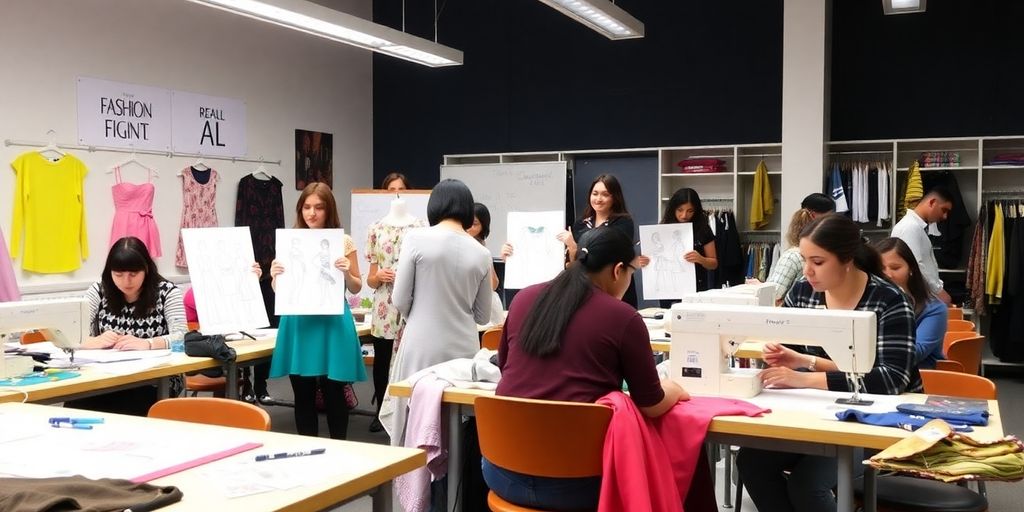The London Fashion Retail Academy is playing a vital role in shaping the next generation of leaders in the fashion industry. With its focus on practical skills and industry connections, it prepares students for the dynamic world of fashion retail. This academy not only provides education but also fosters a community that supports career growth and innovation. Let’s explore how this institution is making a difference in the fashion landscape.
Key Takeaways
- The London Fashion Retail Academy focuses on developing future leaders in fashion.
- It offers hands-on training tailored to the needs of the industry.
- Partnerships with well-known brands enhance learning opportunities.
- The curriculum emphasizes practical experience and digital skills.
- Networking through the academy opens doors for graduates.
The Role Of The London Fashion Retail Academy In Industry Development
The London Fashion Retail Academy plays a vital role in shaping the fashion industry by providing specialized education and training. It acts as a bridge between academic learning and the practical demands of the fashion world. The academy focuses on equipping students with the skills and knowledge needed to succeed in various roles, from design and merchandising to retail management and marketing. It’s about more than just teaching; it’s about preparing the next generation to lead and innovate.
Training Future Leaders
The academy is dedicated to training future leaders in the fashion retail sector. This involves a curriculum designed to foster critical thinking, problem-solving, and strategic decision-making skills. Students are encouraged to develop their leadership potential through various projects, simulations, and real-world experiences. The goal is to produce graduates who can confidently take on leadership roles and drive positive change within the industry. The academy’s approach ensures that students are not only knowledgeable but also capable of leading teams and initiatives effectively.
Industry-Specific Skills
One of the key strengths of the London Fashion Retail Academy is its focus on industry-specific skills. The curriculum is carefully crafted to address the evolving needs of the fashion retail landscape. This includes:
- Practical training in areas like visual merchandising and buying.
- Understanding of supply chain management.
- Knowledge of current trends and consumer behavior.
- Proficiency in digital marketing and e-commerce.
By focusing on these specific skills, the academy ensures that its graduates are well-prepared to enter the workforce and make immediate contributions to their employers. This targeted approach sets the academy apart and makes its graduates highly sought after by leading fashion brands.
Partnerships With Brands
The London Fashion Retail Academy actively cultivates partnerships with leading fashion brands. These collaborations enhance employee retention and provide students with invaluable opportunities for internships, mentorships, and real-world projects. These partnerships also ensure that the academy’s curriculum remains relevant and aligned with industry standards. For example, the academy partnered with Paul Smith to develop a leadership program, gathering insights from managers to shape a new approach to leadership. These collaborations impact the career progression of students and provide a direct pathway to employment after graduation.
Curriculum Highlights At The London Fashion Retail Academy
The London Fashion Retail Academy really shines when you look at what they teach and how they teach it. It’s not just about textbooks; it’s about getting your hands dirty and learning what the fashion world is really like.
Diverse Course Offerings
The Academy isn’t a one-size-fits-all kind of place. They’ve got courses covering pretty much every aspect of the fashion business. Whether you’re dreaming of being a designer, a buyer, or a marketing guru, there’s something for you. They have short courses too, if you want to dip your toes in before committing to a longer program. The variety is impressive, and it means you can really tailor your education to fit your specific goals.
Focus On Practical Experience
This is where the Academy really stands out. It’s not just about sitting in lectures all day. They put a huge emphasis on getting real-world experience. Think internships, workshops, and projects that mimic what you’d actually be doing on the job. This hands-on approach is so important because it helps you build your skills and your confidence. Plus, it looks great on your resume when you’re ready to start your career. For example, Level 4 diplomas include a three-week experience with a major fashion brand.
Integration Of Digital Skills
Let’s be real, the fashion industry is online now. The Academy gets that, and they make sure you’re up to speed with all the latest digital tools and trends. That means learning about e-commerce, social media marketing, data analytics, and all that good stuff. They understand the importance of adapting to market changes and give you the skills you need to succeed in today’s digital world.
The Academy’s approach is all about preparing you for the real world. They know that the fashion industry is competitive, and they want to give you every advantage possible. That’s why they focus on practical skills, industry connections, and a curriculum that’s always evolving to meet the needs of the market.
Success Stories From The London Fashion Retail Academy
The London Fashion Retail Academy has a track record of turning out some seriously impressive people. It’s not just about learning the fundamentals of fashion; it’s about shaping future leaders. Let’s look at some examples.
Case Study: Paul Smith
Paul Smith, a well-known British brand, partnered with the FRA to revamp its management development strategy. The goal was to address skills gaps and build on existing strengths within their workforce. The FRA’s Talent Development team worked with over 250 Paul Smith managers and senior leaders. The program included skills-mapping exercises and was tailored to Paul Smith’s strategic goals. One of the biggest impacts? Creating a community for managers who previously worked in silos. According to Paul Smith CEO, Ashley Long, “People are our greatest asset.”
Impact On Career Progression
It’s easy to see how the London Fashion Retail Academy helps people move up in their careers. The academy gives people the skills and knowledge they need to succeed in the fashion industry. Graduates often report faster career advancement and increased job satisfaction. The evolving job landscape in fashion is competitive, and the academy helps its students stand out. Here’s a quick look at some potential career paths:
- Entry-Level: Retail Associate, Visual Merchandiser Assistant
- Mid-Level: Store Manager, Buyer, Marketing Coordinator
- Senior-Level: Regional Manager, Brand Manager, Creative Director
Community Building Among Graduates
Beyond individual success, the London Fashion Retail Academy fosters a strong sense of community among its graduates. This network provides ongoing support, mentorship, and collaboration opportunities. The alumni network is a valuable resource for graduates, offering connections and insights into the industry. Collaborative projects and events further strengthen these bonds.
The FRA’s focus on community building is a key differentiator. It’s not just about getting a qualification; it’s about joining a network of like-minded individuals who can support each other throughout their careers.
Innovative Teaching Methods At The London Fashion Retail Academy
The London Fashion Retail Academy isn’t just about lectures; it’s about doing. They’ve really leaned into methods that get students involved and ready for the real world. It’s a hands-on approach that sets them apart. Let’s take a look at some of the ways they do it.
Interactive Workshops
Forget sitting passively in a classroom. The Academy uses interactive workshops to make learning stick. These aren’t your typical lectures; they’re dynamic sessions where students actively participate, solve problems, and work together. For example, a workshop on visual merchandising might involve students creating window displays using provided materials and receiving immediate feedback. Or, a buying and merchandising workshop could simulate a real buying trip, complete with budget constraints and supplier negotiations. These experiences help students develop critical thinking and collaboration skills.
Mentorship Programs
One of the coolest things about the Academy is its mentorship program. Students get paired with industry professionals who provide guidance, support, and real-world insights. It’s like having a personal advisor who’s already been there and done that. Mentors help students navigate their studies, make career choices, and build their professional networks. This kind of one-on-one attention can make a huge difference in a student’s confidence and direction. It’s a chance to learn from someone who knows the ins and outs of the fashion industry.
Real-World Projects
The Academy emphasizes learning by doing, and real-world projects are a big part of that. Students work on projects that simulate actual industry tasks, giving them practical experience and a taste of what their future careers might look like. These projects might involve designing a collection for a specific target market, developing a marketing campaign for a new product, or managing the inventory for a pop-up shop. By tackling these challenges, students develop problem-solving skills, learn to work under pressure, and build a portfolio of work that showcases their abilities.
The focus on practical application is what makes the Academy’s approach so effective. It’s not just about theory; it’s about giving students the tools and experience they need to succeed in a competitive industry.
The Importance Of Upskilling In Fashion Retail

The fashion retail world is always changing. What’s popular today might be old news tomorrow. That’s why upskilling is so important. It’s not just a nice-to-have; it’s a must for anyone wanting to stay ahead.
Adapting To Market Changes
The market never stands still. New trends pop up, technology evolves, and customer preferences shift. Upskilling helps you keep up with these changes. Think about how e-commerce has changed the game. If you don’t know about online marketing or data analytics, you’re going to struggle. It’s about learning new tricks to stay relevant.
Enhancing Employee Retention
Employees want to grow. If they feel stuck, they’ll look for opportunities elsewhere. Offering upskilling programs shows you’re invested in their future. This can lead to happier employees and less turnover. Plus, skilled employees are more productive, which is a win-win. digital literacy is a must-have in today’s world.
Building A Competitive Workforce
A company is only as good as its people. A workforce with up-to-date skills gives you a serious edge. You can offer better service, come up with more innovative products, and respond faster to market demands. It’s about creating a team that’s ready for anything.
Upskilling isn’t just about learning new things; it’s about creating a culture of continuous improvement. It’s about making sure everyone has the tools they need to succeed, no matter what challenges come their way. It’s an investment in the future, plain and simple.
Here’s a quick look at how upskilling can impact a fashion retail business:
- Improved customer satisfaction
- Increased sales
- Better employee engagement
Future Trends In Fashion Education

Fashion education is changing fast. It’s not just about sketching designs anymore; it’s about understanding technology, sustainability, and global markets. The London Fashion Retail Academy is keeping up with these changes to prepare students for what’s coming.
Emphasis On Sustainability
Sustainability is no longer optional; it’s essential. Fashion education is now focusing on eco-friendly materials, ethical production, and reducing waste. Students are learning about the impact of the fashion industry on the environment and how to create more responsible designs. This includes courses on sustainable materials and circular fashion models.
Technological Advancements
Technology is transforming the fashion industry. From 3D printing to AI-powered design tools, students need to be tech-savvy. Fashion education is incorporating digital design, virtual prototyping, and e-commerce strategies. The goal is to equip students with the skills to thrive in a digital world. For example, learning how to use digital clothing is becoming standard.
Global Perspectives In Fashion
The fashion industry is global, and education needs to reflect that. Students are learning about different cultures, markets, and consumer behaviors around the world. This includes studying international fashion trends, supply chain management, and cross-cultural communication. Understanding the global landscape helps students create designs that resonate internationally.
Fashion education is evolving to meet the demands of a rapidly changing industry. By focusing on sustainability, technology, and global perspectives, institutions like the London Fashion Retail Academy are preparing students to be the leaders of tomorrow.
Networking Opportunities Through The London Fashion Retail Academy
The London Fashion Retail Academy understands that succeeding in the fashion industry isn’t just about what you know, but who you know. That’s why they put a big emphasis on creating lots of chances for students to connect with people already working in the field. It’s all about building relationships that can help you now and later in your career. Let’s take a look at how they do it:
Industry Connections
The Academy actively works to bring industry professionals into the students’ world. This isn’t just about guest speakers (though they have those, too!). It’s about creating real, meaningful interactions. For example, they organize workshops led by people from well-known brands, giving students a chance to learn directly from the source and ask questions. They also arrange visits to company headquarters and fashion events, so students can see how things work behind the scenes and start a job immediately.
Alumni Network
One of the most valuable resources the Academy offers is its alumni network. Think of it as a built-in support system of people who have been in your shoes and are now working in various roles across the fashion world. The Academy facilitates connections between current students and alumni through:
- Networking events specifically for alumni and students.
- An online platform where alumni can offer advice and mentorship.
- Alumni spotlights, showcasing successful graduates and their career paths.
The alumni network isn’t just about getting a job; it’s about finding mentors, collaborators, and friends who understand the unique challenges and opportunities of the fashion industry.
Collaborative Projects
Another way the Academy helps students build their network is through collaborative projects. These projects often involve working with real companies on real-world challenges. This gives students a chance to:
- Showcase their skills to potential employers.
- Learn how to work effectively in a team.
- Build relationships with industry professionals who are involved in the projects.
These projects are designed to mimic the kind of work students will be doing after graduation, making the transition from school to career much smoother.
Looking Ahead: The Future of Fashion Leadership
In conclusion, the Fashion Retail Academy is playing a vital role in shaping the next generation of leaders in the fashion industry. By providing tailored training and development programs, they are not just filling gaps in skills but also fostering a sense of community among aspiring managers. As brands like Paul Smith partner with the FRA, they are investing in their future by nurturing talent from within. This approach not only prepares individuals for the challenges ahead but also strengthens the entire industry. For anyone looking to grow in fashion retail, the opportunities at the FRA are truly worth exploring.
Frequently Asked Questions
What is the London Fashion Retail Academy?
The London Fashion Retail Academy is a school that helps people learn about fashion and retail. It teaches skills needed to work in these areas.
What kind of courses does the Academy offer?
The Academy offers many different courses, including practical experiences and digital skills that are important in today’s fashion world.
How does the Academy help students find jobs?
The Academy helps students connect with fashion brands and offers networking opportunities, which can lead to job placements.
What are some success stories from the Academy?
Many graduates have gone on to work for well-known brands like Paul Smith and have made significant progress in their careers.
Why is it important to keep learning in fashion retail?
The fashion industry changes quickly, so keeping skills up to date helps workers stay relevant and successful.
What trends are shaping the future of fashion education?
Future trends include a focus on sustainability, using new technology, and understanding global fashion markets.

Peyman Khosravani is a global blockchain and digital transformation expert with a passion for marketing, futuristic ideas, analytics insights, startup businesses, and effective communications. He has extensive experience in blockchain and DeFi projects and is committed to using technology to bring justice and fairness to society and promote freedom. Peyman has worked with international organizations to improve digital transformation strategies and data-gathering strategies that help identify customer touchpoints and sources of data that tell the story of what is happening. With his expertise in blockchain, digital transformation, marketing, analytics insights, startup businesses, and effective communications, Peyman is dedicated to helping businesses succeed in the digital age. He believes that technology can be used as a tool for positive change in the world.











